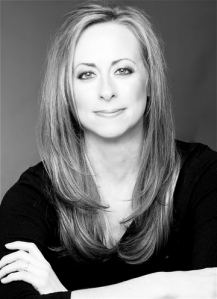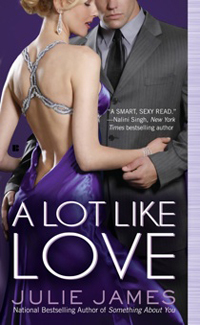 |
| My guest--Julie James. |
Note: Each year I conduct interviews with famous authors who will be guests at various conferences. Julie will be appearing at
Love Is Murder, Feb. 3-5, 2011, in Chicago.)
1. Julie, you were an attorney before you went into writing novels full-time. What is it about training as an attorney that seems to make for such fantastic authors? What did you learn in your work as a lawyer that you still use when you write today?
A. Maybe all us lawyers write simply to escape our day jobs? Kidding! (Mostly.) I think it’s a couple things. First, as a lawyer, you write a lot. Second, as a trial lawyer, your job in many ways is to tell a story—to take the facts and present them in a way that hooks the reader or listener (i.e., the judge or the jury) and convinces them to accept the story as you tell it. Plus, being a lawyer involves many hours sitting in front of a computer. Good training for a full-time career as a writer.

2. In the “traditional” romance novel, the hero and the heroine must be kept apart, usually by misunderstandings. You, however, do a fabulous job of throwing in one crisis after another that keeps your characters apart. Do you plot all this out in advance? How do you keep coming up with believable interruptions rather than the trite “misunderstandings” that blemish a lot of romance novels?
A. I actually find that the Big Misunderstanding isn’t used all that much in romance—at least not the ones I’ve read. From time to time, I’ll see a review of a book that uses the Big Mis as a device, and if it’s not done well readers will call an author out on that fast. That’s not to say you can’t have misunderstandings in a story—of course you can, we have misunderstandings in real life. But if your characters are smart, rational people, you can’t drag out a misunderstanding for too long that could be cleared up by one simple conversation.
In answer to your other question, yes, I do plot out my books in advance. I generally put together about a fifteen to twenty page outline of the book, which I use when writing a synopsis for my editor. But when I’m actually writing the book, I rarely look back at the outline. By that point, the book is developed enough in my head, and I want the freedom to deviate from the outline if that’s where the story takes me.
3. You say you think of your voice as “smart, sexy and sophisticated.” Your characters banter, and they crack jokes in such a way that the dialog reveals a unique voice. How did you find your voice? Do you ever have days when it doesn’t show up for work? If so, how do you reclaim it?
A. LOL, is that what I said about my voice? Apparently, my voice also includes being a little full of myself. : ) I actually wrote screenplays before I began writing novels, and my books certainly tend to be dialogue-focused. My characters are usually somewhat on the sarcastic side. Perhaps a lot on the sarcastic side. And typically there’s a lot of back-and-forth banter between the hero and heroine.
Do I ever have days where my voice doesn’t show up for work? Hmm. . . I’d say not really. But that doesn’t mean I don’t get stumped. Sometimes I’m trying to do something with a scene that just isn’t working, sometimes a plot point isn’t developing the way I want, or sometimes I struggle with getting the tone of a scene right. But my voice, so to speak, is typically there.
4. You went to your first RWA convention prior to becoming a published author. Most folks won’t “pop” for a conference until they have a book. What was your thinking? Was it of value to you? Would you recommend other pre-published authors attend conferences before they have a book in hand?
A. I was pretty unfamiliar with the romance genre until I’d learned from my editor, after selling my first book, that I had, in fact, written a romance. (I’d called the book a “romantic comedy” when we sold it.) So for me, it was valuable to attend the conference simply to familiarize myself with the genre. Also, I think conferences offer great networking opportunities—I met several authors at that first conference with whom I continue to be friends. And there are a lot of helpful workshops at these conferences for both published and unpublished authors—I still attend workshops, even though I’ve written five books and now present workshops myself. There’s always room to learn more.
So bottom line, I think attending conferences can be very valuable, and I do recommend them to pre-published authors—IF it’s financially feasible. Let’s be honest, these conferences often aren’t cheap!
5. You are a big believer that “action speaks louder than words.” How do you come up with the right actions to reveal your character’s inner worlds?
A. Hmm, did I say that somewhere? I mean, sure, I believe that—particularly with my characters, who often use sarcasm to deflect their deeper emotions. I’ll give you an example—in my most recent book, A Lot Like Love, the hero (an FBI agent) and the heroine (a billionaire heiress who owns a wine store) have to pretend to be a couple as part of an undercover sting operation. Now, they say they don’t like each other— and there’s a lot of back and forth banter and sarcasm between them. But the hero stops by the heroine’s wine store one night, and sees that her store is so crowded she hasn’t had time to take a break and eat dinner. So he leaves and comes back with a Portillo’s burger and cheese fries for her. And sure, he grumbles through the whole thing and makes all sorts of wry comments about how billionaire heiresses probably don’t eat cheese fries, and how she’s too thin already, but regardless, the actions speak for themselves—she was having a rough day at work so he went out and got her dinner. Even if he’s sort of cranky about it, it’s still romantic.
6. I think you write the BEST sex scenes of any author I’ve ever read. They are hot without being gross. Care to share tips on how to do a scene that sets the reader’s pulse racing without grossing her out?
A. Thank you! And… I’m kind of wondering what books you’re reading where the sex scenes are gross. Because that’s not good for anyone. : )
Honestly, one way I think you can make a scene instantly hotter is with dialogue. A few good old-fashioned dirty words, when well-timed, can get the pulse racing. Also, one of the key things is that the sex scenes need to be a continuation of the characters’ relationship. Meaning, if the hero and heroine have been trading all sorts of quips and banter throughout the book, well, they should continue that playfulness, that teasing, in the bedroom as well. No matter how descriptive, those scenes should be about the emotions the characters are feeling. Heck, even if it’s a one-night stand, and all the guy is thinking is “Oh my god, yes—I’m getting laid!!, well, that’s the emotion you need to convey in the scene. Sex is intimate, and people are (literally) exposing themselves and making themselves vulnerable to another person, so there needs to be some sense of what’s going on in the characters’ heads.
7. Please talk about the differences between the romance market and the mystery market. Is one more important to you than the other? How are the fans different?
A. Candidly, I’m not that familiar with the mystery market. But I’ve written two romantic suspense novels, and I’m sure there is some crossover. What I can say is that romance readers tend to be extremely voracious readers, and I’m truly appreciative that my books have been so well-received by fans of the genre.
8. Go back in time and talk to Julie before her first book was published. What would you say to her?
A. Oh gosh, this is like the, “What would you say to yourself if you could go back to high school” question. I’m always terrible at these types of questions. I don’t know that I have some great, deep answer so instead I’ll give a practical response. One thing I wished I had known before I was published was how much promotion authors need to do themselves. That would not have changed my decision to write—not at all—but I was pretty clueless after selling my first book when it came to marketing. So writers should be aware that this job does, in fact, involve more than actually writing.
And here’s something perhaps a little deeper: I think I would tell myself that my writing process is my own, and not to worry about how other authors write, or—more specifically, how fast they write. I tend to be a slow writer—I do a book a year in a genre in which many authors write two or more books a year. So I’m constantly reminding myself that it doesn’t matter how fast I go—what’s most important is that I’m pleased with the outcome, regardless of how long it took me to get there.
Learn more about Julie by visiting her website:
http://juliejames.com/



